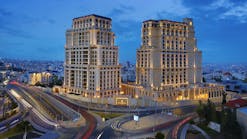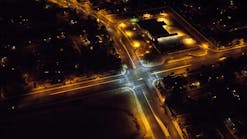Spain's Guadalajara connects 12,000 new Philips LED street lights to a web browser
The city ties in the electrical cabinets, too, for better management. Smart city functions could follow.
It's smart lights now, smart city later for Guadalajara, Spain.
The small city about 40 miles northeast of Madrid has installed 12,000 Philips LED street lights and connected them to Philips' CityTouch management software to allow remote monitoring and management of lights and of related electrical cabinets, via a web browser.
Interested in articles & announcements on lighting and smart city applications?
CityTouch allows the system's operators to dim or brighten the illumination as needed in different pockets of the city, such as at pedestrian crossings or public squares. By tying them into the electrical cabinets — a new feature for CityTouch — Guadalajara is better able to manage power consumption through the grid, and to monitor electrical outages and leakages, Philips said.
The software provides a map-based view of all light points and of 198 cabinets, making it easier for Guadalajara to spot trouble spots and dispatch maintenance crews. The lights and cabinets communicate with the central control room via a cellular phone network.
Philips partnered with energy services provider Ferrovial Services on the job, which has already reduced energy consumption by 68% compared to the old sodium high-intensity discharge (HID) lights. The new system went live in late 2016.
On the road to smart: Guadalajara is settling for smart lights now, and could eventually add sensors to the lighting to support other smart city functions. (Photo credit: Philips.)
The new LED street lights will be able to house chips and sensors to support smart city operations in the future, although Guadalajara has chosen not to install them at this time. Outdoor lighting vendors are hoping to embed such electronics in luminaires or mount them on lighting hardware such as lampposts, and thus win a larger chunk of the smart city business, beyond just illumination.
Such smart city services could provide information on traffic, parking, noise, air quality, crime, road surface states, and a whole host of other conditions, broadening lighting's Internet of Things (IoT) scheme. It is still early days, however, and it is not uncommon at this point for cities to settle on upgrading the lighting, while leaving open the possibility of adding other services in the future. Knoxville, TN, for example, recently went with a straight-up street lighting system from Siemens and Acuity Brands' Holophane division, holding out the possibility of adding sensors to the Holophane luminaires later.
"We were keen to implement a sustainable public lighting system that not only provides our citizens and visitors with the light they need today but which is also scalable and flexible to meet the future needs of our city,” said Guadalajara mayor Antonio Román. “What we now have is a smart new digital infrastructure that gives us the option to connect sensors and offer smart city functionality if we so wish."
The new system comes ahead of Guadalajara's upcoming role as a 2018 European City of Sport, as chosen by the Brussels-based European Capitals and Cities of Sport Federation (ACES Europe).
Philips continues to advance the state of remote lighting management. It recently opened a computer and network center in Bengaluru, India, to provide networked operations and data services from around the world.
MARK HALPERis a contributing editor for LEDs Magazine, and an energy, technology, and business journalist ([email protected]).

Mark Halper | Contributing Editor, LEDs Magazine, and Business/Energy/Technology Journalist
Mark Halper is a freelance business, technology, and science journalist who covers everything from media moguls to subatomic particles. Halper has written from locations around the world for TIME Magazine, Fortune, Forbes, the New York Times, the Financial Times, the Guardian, CBS, Wired, and many others. A US citizen living in Britain, he cut his journalism teeth cutting and pasting copy for an English-language daily newspaper in Mexico City. Halper has a BA in history from Cornell University.





